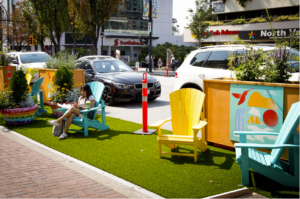 In May of 2020, the City of North Vancouver launched Open Streets - Central Lonsdale as a temporary response measure to support economic and social recovery efforts in the City's Commercial Corridor through the COVID-19 pandemic. By reclaiming the streetscape to expand the sidewalk for people to move safely through the corridor and for businesses to operate, the City provided a quick, responsive and low-cost initiative to support the area effectively.
In May of 2020, the City of North Vancouver launched Open Streets - Central Lonsdale as a temporary response measure to support economic and social recovery efforts in the City's Commercial Corridor through the COVID-19 pandemic. By reclaiming the streetscape to expand the sidewalk for people to move safely through the corridor and for businesses to operate, the City provided a quick, responsive and low-cost initiative to support the area effectively.
Placemaking initiatives significantly contributed to the activation and beautification of the newly expanded streetscape, bringing energy to the area to support community and business. Street interventions such as parklets, street seats, urban gardens, art and programming have expanded people's perspective on what Central Lonsdale can be and have enhanced street vibrancy, community and social connection. Through placemaking the project has evolved from a quick response measure to a successful long-term recovery initiative, supporting a more vibrant, people-focused commercial area.
Capitalizing on our local community assets, placemaking through Open Streets has enlivened Central Lonsdale in ways that promote prosperity and celebrate neighbourhood identity. It's evolved into a long term recovery initiative that's inspired the community to get excited about the future of Lonsdale and reimagine the Commercial Corridor as a destination street.
Placemaking has opened the door and increased opportunities to directly engage with community and businesses on the ground in meaningful ways. It's connected communities, people, places, and economic opportunity via physical spaces and new relationships.
Parklets especially have provided an open platform "fill-in-the-blank" for the communities they serve, contributing quality public spaces for businesses and community to share collectively. From business owners Annette Kim and Alexander Payne - "I wish to say that, as a business owner, the modified shipping container/parklet has allowed my coffee shop to stay open for business, pay my bills, and maintain my staffing levels during COVID. THANK YOU for allowing my business to survive and our community to thrive."
Placemaking has increased place identity and street character paving the way for a future high street that supports a strong area of commerce and community pride.
Results
Through the pandemic, placemaking generated over $120,000 in sponsorship and in-kind support to expand parklet and placemaking development. Parklets grew from 1 to 8, including 2 shipping container parklets, the first in Metro Vancouver. New partnerships through placemaking developed with Squamish Nation, Waterfront partners Seaspan and Neptune, the United Way of the Lower Mainland and the Lower Lonsdale BIA.
Placemaking through the Open Streets Initiative has generated a number of employment opportunities for youth, local contractors and business, local artists and municipal staff:
- Hiring 3 local contractors with 50+ staff to supply and install parklets, accessibility ramps, winterization, gardens and street seats.
- Employing 5 local youth artists through Studio in the City, mural projects and street art
- Employing 12 youth art apprentices through the Studio in the Streets, City program
- 1 Squamish Nation Artist Commission
- 1 Seaspan/SRY project collaboration with local shipbuilders
- 1 United Way Central Lonsdale Community Builder and Volunteer Placemaking Team
- 1 Open Streets and Placemaking Coordinator and 1.5 Auxiliary Maintenance Workers (CNV)
With community-based participation at its center, this placemaking model can be implemented in any community. It's proven an effective tool to inspire people to collectively reimagine and reinvent quality public spaces that contribute to community prosperity and well being.
Placemaking initiatives in the City of North Vancouver have inspired other municipalities to consult on our approach to parklets and street seats with similar efforts carried out in the District of North Vancouver and Squamish respectively, and the City of Delta, Vancouver and Calgary respectively.
Lessons Learned:
1- The power of small interventions - Never underestimate the power of small community based interventions to generate interest and have significant impact.
2 - We became leaders on a number of fronts - A number of municipalities and organizations engaged with City staff to consult on our approach to reallocated street space, parklets and public space activation. Our approach to winterized public spaces such as our shipping container parklets have been replicated in other cities.
3 - Keep it Modular - Investing in modular elements within the streetscape has helped staff adapt quickly to the changing needs of businesses, the seasons and health restrictions related to the pandemic. Modular elements provide flexible spaces to reconfigure or repurpose, reducing costs and materials.
4 - Increased waste - The pandemic has resulted in increased take out waste in activated areas of Open Streets indicating that these spaces are serving adjacent businesses but lack stewardship.